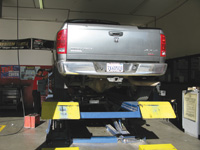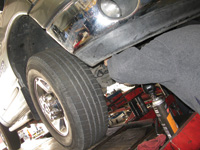 In a perfect world the full-time RVing lifestyle would be an easygoing adventure without the inconvenience of mechanical failures. Our home on wheels would consistently hum like a champ as we rolled from mountains to the sea, with nothing getting in the way of our next destination.
In a perfect world the full-time RVing lifestyle would be an easygoing adventure without the inconvenience of mechanical failures. Our home on wheels would consistently hum like a champ as we rolled from mountains to the sea, with nothing getting in the way of our next destination.
Unfortunately, real life occasionally interrupts every RVing adventure, usually at the worst possible time. As full-time RVers since 2007, some of the most stressful times my husband and I have endured on the road involved RV repairs. The following tips demonstrate how you can learn from our greenhorn mistakes to keep your rig running smoothly for hassle-free adventures.
Step 1: Learn to Drive Your RV
Taking an RV driving course is one way to steer clear of repair shops. Knowing the differences between driving RVs and driving cars, and knowing how to handle your rig in all conditions will put less wear and tear on your traveling home.
Jim and I never thought of taking an RV driving class when we started out. Thousands of dollars later, we wish had we learned the finer points of handling our rig before we traversed the Continental Divide. Less than two years into our full-timing lifestyle we found ourselves in a small mountain town with a bad braking system on our Dodge Ram and nowhere to turn other than an unscrupulous mechanic who spied our out-of-state license plates, saw the panicked look on our faces, and drooled. Had we been taught the intricacies of trailer braking systems and the value of a good quality brake controller before this incident, we might have been spared the agonizing experience of spending $2,000 for a premature brake overhaul. Unfortunately we learned the hard way, as many novice RVers do.
If you are new to RVing, learn from our experience. Enroll in a good driving safety course like the one offered at RV Driving School (rvschool.com). The money you spend on your RV education will be far less than a brake overhaul or other major repair that could be prevented. You might even save money on insurance if your school is endorsed by your RV policy provider.
Step 2: Perform Preventive Maintenance
 We know that preventive maintenance is the smart thing to do, but as full-timers Jim and I sometimes put it off too long because of the hassle involved with working on our rig in an RV park, or finding a shop that will let us camp on their lot if the job isn’t done in one day.
We know that preventive maintenance is the smart thing to do, but as full-timers Jim and I sometimes put it off too long because of the hassle involved with working on our rig in an RV park, or finding a shop that will let us camp on their lot if the job isn’t done in one day.
When you’re full-time RVing, the easiest way to stay on top of preventive maintenance is by camping in RV parks that are sensitive to the needs of full-timers. Although many parks won’t allow any kind of on-site maintenance, some parks run by private RV clubs may be more accommodating to members who need to perform minor repairs on their rigs in a responsible manner. Another option is to find a park where full-timers spend entire seasons, especially smaller Mom and Pop operations located off-the-beaten-path. Most importantly, always ask before spreading out your tools. On more than one occasion, we have found park owners to be sensitive to our needs if not downright helpful.
Step 3: Find a Reputable Shop
If the creaking noise from your wheels isn’t being drowned out by your stereo, it’s time to find a reputable mechanic. Thanks to the Internet, finding a reliable, trustworthy shop is as easy as going online to find customer reviews. Although some websites are clearly stacked with glowing reviews that seem too good to be true, most of the shops we have researched and then patronized were in line with what other customers (or victims) said about the business. We often turn to the following websites for feedback from others.
RV Service Reviews (RVServiceReviews.com): This unaffiliated, advertiser-free website allows RVers to share rants and raves about shops all over the U.S. and Canada. Reviewers are asked to leave detailed descriptions about the type of work that was performed and provide an overall evaluation of the work, the shop and the quality of service. We know that many shops monitor this site; we once left a review about a shop where we had a rather unpleasant experience and less than three days later, we received an apologetic phone call from the shop’s service manager.
RVing Communities: Fellow RVers are one of the best resources when you are looking for mechanical help. Clubs like Escapees.com and NuRVers.com feature discussion forums where you can ask members for referrals, or post your own RV shop reviews. You will also find numerous Facebook groups for quick feedback from fellow RV enthusiasts. When interacting online, make it easier for people to help you by stating your location, specifics about your rig, and details about the symptoms for any repairs you think your RV requires.
Angi: (angi.com): A monthly or yearly membership for less than $40 can get you access to business reviews by enthusiastic members around North America. What makes Angie’s List stand out from similar sites is that users cannot post anonymously; companies can’t post reviews on themselves or competitors (but they can respond to customer reports), and the Angie’s List Complaint Resolution Team will assist you in resolving bad customer service experiences.
Yelp (yelp.com): We frequently use Yelp whether we’re looking for a nearby repair shop or the best barbecue in Kansas City. We love Yelp because although the site accepts paid advertisements, businesses don’t have a say in where their reviews appear, nor can they change them. And unlike reviews on Google, Yelp’s technology is smart enough to filter out suspicious reviews that are obviously written by companies, not actual customers. One of the great features on Yelp is a messaging area where you can ask members questions directly, and usually get fast feedback.
For better or worse, full-timing is a constant adventure. On some days the road brings more fun than you can pack into a lifetime, but on other days an overheated engine makes you want to crawl back to the safety of the suburbs. However as long as you face those temporary challenges with a sense of humor and ingenuity, the full-timing lifestyle will consistently reward you with life’s most exciting, memorable journeys.
Do you have more advice for coping with mechanical issues on the road, or other helpful tips for full-time RVers? If so, I’d love to know your thoughts. E-mail me at rene@agreda.com with suggestions.
Rene Agredano and her husband, Jim Nelson, have been living and working on the road since 2007. Their travel adventures and mishaps are chronicled in their blog, LiveWorkDream.com.

Leave a Reply